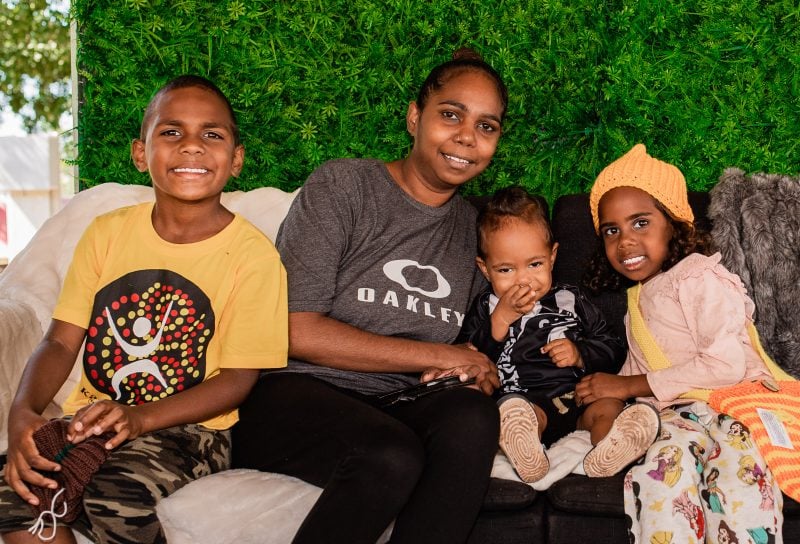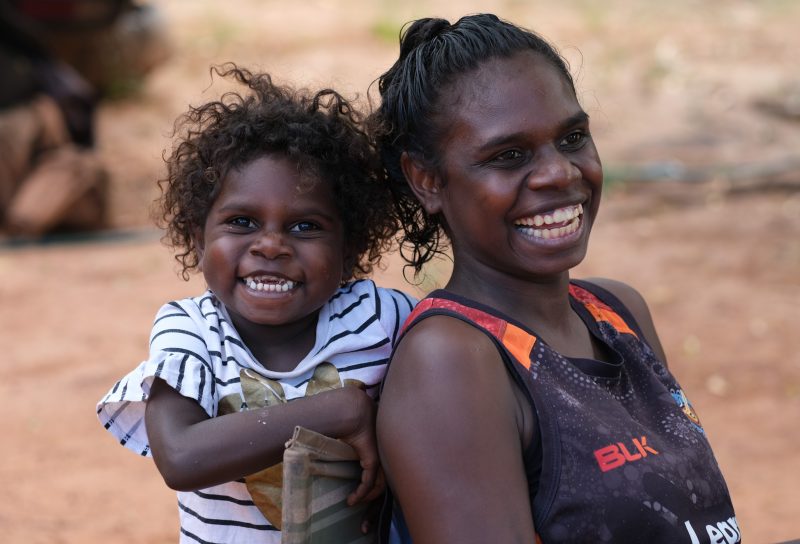What is the Improving Multidisciplinary Responses Program?
The Improving Multidisciplinary Responses Program places Aboriginal and Torres Strait Islander cultural knowledge in the centre of the design and delivery of child and family services, enhancing and improving holistic responses to Aboriginal and Torres Strait Islander families with multiple and complex needs.
The Improving Multidisciplinary Responses (IMR) Program is designed in partnership with Aboriginal and Torres Strait Islander peoples to support government in applying Aboriginal and Torres Strait Islander peoples’ self-determination and community-led initiatives. The IMR Program supports community-led projects in regional, remote and metropolitan areas across Australia, reflecting different community aspirations, operating environments and local priorities.
The IMR Program has been developed in partnership with Aboriginal and Torres Strait Islander peak bodies, advisory groups and representative organisations across all jurisdictions. This partnership has led to the development of a shared decision-making framework that outlines how Aboriginal and Torres Strait Islander peoples will share in the decision-making process throughout the design, implementation and evaluation of the program. This means that Aboriginal and Torres Strait Islander peoples have shared decision-making throughout the design, implementation and evaluation of the IMR Program activities.
The program’s design reflects the Australian Government’s commitment to the four Priority Reforms in the National Agreement on Closing the Gap:
- Formal Partnerships and Shared Decision-Making
- Building the Community-Controlled Sector
- Transforming Government Organisations
- Shared Access to Data and Information at a Regional Level
The IMR Program is also a priority action under Safe and Supported: the National Framework for Protecting Australia’s Children 2021-2031 and is a measure in the Commonwealth Implementation Plan under the National Agreement on Closing the Gap to achieve Target 12: By 2031, reduce the rate of over-representation of Aboriginal and Torres Strait Islander children in out-of-home care by 45 per cent. The Program reflects the Closing the Gap priorities of self-determination and cultural governance.
The IMR Program centres Aboriginal and Torres Strait Islander peoples’ way of knowing, being and doing, to strengthen the safety and wellbeing for our children, and our children’s connection to culture, community, land and language.

Our role
SNAICC offers First Nations Design Support Expertise to help IMR grantees build their capacity and design a service delivery model that will improve outcomes for Aboriginal and Torres Strait Islander children and families.
As Community Partner, SNAICC collaborates with and provides tailored support to each of the 15 IMR grantees, providing:
- Organisational capacity building: Tailored support that includes improving organisational capabilities such as HR, governance and leadership to ensure a solid foundation for successful operation.
- Staff development and support: Assistance in identifying professional development opportunities, as well as developing policies and procedures to empower and promote staff growth.
- Project planning and management: Assist in designing comprehensive project plans, programs and partnership agreements to ensure successful project implementation.
- Recruitment and retention strategies: Help develop strategies to attract and retain employees, ensuring the organisation’s workforce is sustainable and effective.
- Community engagement and accountability: Help establish cultural leadership and governance mechanisms to increase community engagement and ownership.
- Data management and evaluation: Assistance with identifying data collection methods, ensuring data sovereignty and privacy, facilitating regular data sharing with the community and implementing strong evaluation frameworks for continuous improvement.
SNAICC’s tailored approach to support addresses grantees’ specific needs as identified through an online needs assessment and regular yarns with IMR teams.
Community of Practice on Kaurna Country
In early April 2024, Aboriginal community-controlled organisations from across the country came together on Kaurna Country, Tarntanya/Adelaide, to discuss the IMR Program.
This was the first Community of Practice event where Aboriginal community-controlled organisations could share their experiences and current successes since implementing the IMR Program.
Watch the video to learn more about the program and the benefits it has brought to communities across the country.
Wilto Willo Program at KWY
KWY Aboriginal Corporation is one of fifteen grantees chosen to be part of the National Improving Multidisciplinary Responses Program.
From this, the Wilto Willo Program aims to reduce the amount of Aboriginal and Torres Strait Islander children in out-of-home care.
Watch the video to learn more about the program and how it’s incorporating Aboriginal ways of knowing, doing and being.
KWY Aboriginal Corporation
Join Us
Be part of our advocacy efforts and stay informed about our initiatives.
Become a member today and add your voice to the cause.

